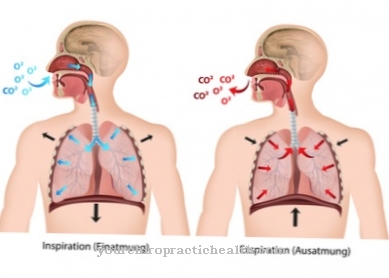Everyone knows them and nobody can protect themselves from them - with Sadness sooner or later everyone has to deal with it. Fortunately, because the often unloved feeling fulfills a meaningful function for us humans. However, grief can also make you sick and have serious consequences.
What is grief
Grief is a general term used to describe an emotional state that is associated with great sadness, depression and deep pain. The affected person's zest for life decreases, if necessary they withdraw and isolate themselves from those around them in order to mourn.
The most common cause of grief is the loss of a loved one. Be it through the separation from a partner or through the death of a family member, to be abandoned by a loved one, in whatever form, lets us humans first plunge into deep despair. But why is it like that? And is it ultimately even healthy to mourn?
Function & task
The grief can best be described as a process that helps our psyche to process what we have experienced. Many psychologists divide this process into four phases, which, however, merge and cannot be strictly separated. First of all, we humans tend to deny what we have experienced, not wanting to admit it and ignoring reality and pushing it away from us. Those affected often report a state of shock during this phase, which is accompanied by numbness and freezing.
Only in the second phase do the emotions finally break up and seem to practically inundate the mourner. Anger, despair, sadness and fear alternate and often lead to excessive demands. As a result of this, the search for a guilty party and ultimately strong feelings of guilt can arise in this phase. However, there is a danger here of getting lost in guilt and anger instead of allowing and accepting the grief. The latter is absolutely necessary for processing what has been experienced, only in this way can the grief phase be overcome.
In the third phase of the process, the person concerned slowly reaches a state in which he accepts what he has experienced and reality catches up with him. Everyday life is gradually resuming, but frequent setbacks can occur when reality collides with grief.
The grieving process ends with the phase of reorientation. Despite the loss, the mourner sees new goals and perspectives, which leads to new courage to face life. The loss is ultimately integrated into the consciousness and can be saved as an experience.The associated emotions are still perceived as stressful, but at the same time the knowledge is gained that you can endure losses and survive.
The process of mourning is thus an extremely helpful phenomenon in our psyche in order to be able to deal better with severe losses. Unfortunately, the grief work does not work by itself and requires the active participation of the person concerned in order to really be able to complete the process. If this does not happen and the mourner remains in one of the mourning phases without developing further, in many cases serious consequences arise that can ultimately only be resolved in pathological grief work.
You can find your medication here
➔ Medication to lighten the moodIllnesses & ailments
On the one hand, grief is often suppressed in order not to have to face painful and unpleasant feelings. On the other hand, we also live in a performance society that regularly makes it clear to us that only motivated, mentally balanced and perfectly healthy people are willing to perform. There is seldom room for mourning, let alone time. The pressure from outside to mourn a little faster and “to let it be good at some point” causes many affected people not to get involved in the uncomfortable feelings and instead to distract themselves with work or other things.
In the beginning this even seems to work, but pain and grief cannot be completely suppressed and eventually work their way to the surface. Often the emotions then show up in the form of depression, which ultimately force the person affected to deal with their own emotional world and to seek professional help in order to take up the grief work with support. Here, however, the normal grieving process should not be confused with pronounced depression, depression and a temporary loss of courage are part and parcel of mourning.
Unresolved grief can also result in other illnesses, such as fears and panic attacks, which ultimately determine everyday life. The suppressed feelings can even manifest themselves psychosomatically, for example in the form of persistent nausea, frequent stomach or headaches as well as constant fatigue and exhaustion. Those affected often report sleep disorders and nightmares.
Grief can manifest itself in a variety of symptoms, but in any case it should not be ignored but dealt with, no matter how long the grieving process takes. In general, it can be stated that the grief work has to be designed individually and it is not possible to predict how long the person affected is "allowed" to suffer or when he will have to function again. Depending on the personality and the severity of the loss, the grief process can vary widely and cannot be determined across the board.



























